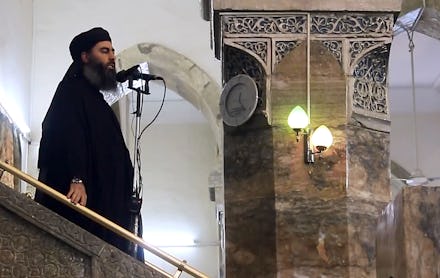More Americans Than Ever Think the Terrorists Are Winning, Even As ISIS Leader Panics

Americans end 2015 amid discordant headlines about the fight against the Islamic State terrorist group, also known as ISIS or ISIL. On Monday, Iraqi forces retook the center of the city of Ramadi from ISIS, delivering a dramatic setback to the group as its leader scrambles to boost morale. At the same time, fazed by attacks in Paris and San Bernardino, California, more Americans than ever are convinced that terrorist forces are prevailing over the U.S. and its allies.
The divergent pieces of information underscore the searing power of traumatic events, and the fear that emerges from them — often clouding other developments.
Setbacks for ISIS: Under pressure from international airstrikes and regional forces on the ground, ISIS finds itself increasingly embattled in Iraq and Syria, with the pace of strikes increasing since the Nov. 13 Paris attacks. Seeking to stave off a decline in morale, ISIS head Abu Bakr al-Baghdadi over the weekend released his first audio recording in more than half a year, saying the group was besieged by international forces.
"Do not be amazed by the meeting of the nations of disbelief and groups against the Islamic State," al-Baghdadi said, per CNN. "If we are killed and the wounds are numerous and the problems amassed against us and the hardships are great, then it is no surprise either."
The retaking of central Ramadi on Monday poses yet another challenge for ISIS. As the BBC notes, ISIS' May capture of Ramadi — just 55 miles from Baghdad — marked a humiliating low for the Iraqi government, and retaking control of the city has been a top priority for Prime Minister Haider al-Abadi's government.
There are conflicting reports on how much of Ramadi remains under ISIS control; the Washington Post reports that an Iraqi military spokesman deemed the city "fully liberated," while another military official estimated that 30% of the area remains in ISIS hands.
At any rate, the Iraqi government's gains in Ramadi, which were assisted by U.S. air power, point to ISIS' new struggles in holding onto crucial territory in its Iraqi and Syrian strongholds, even as the group gains a foothold in countries like Libya.
A fearful America: Meanwhile, a CNN/Opinion Research Corporation poll released Monday found that a record 40% of Americans think terrorists are winning their battle against the U.S., while another 40% thought neither side had the upper hand. Only 18% believed the U.S. and its allies were winning.
The pessimism was particularly pronounced among Republicans; 55% of GOP voters say the terrorists are winning, compared to only 24% of Democrats and 40% of independents.
The poll finds Republican voters strongly support more aggressive steps to combat ISIS; while Americans overall split 49%-49% on sending ground forces to the region, 70% of Republicans favor American boots on the ground, with only 27% opposed.
The findings help illustrate why Republican presidential frontrunner Donald Trump has only surged in the polls following the attacks in Paris and San Bernardino, despite predictions that the attacks would reshape the race to favor candidates with greater foreign policy experience. Rather than prompting Republicans to rethink whether he'd be a steady hand at the tiller, Trump's bombastic rhetoric has spoken to the visceral fears roiling the GOP post-Paris and San Bernardino.
Although Trump has offered little in the way of specifics on fighting ISIS — besides proposing a ban on foreign Muslims entering the U.S., he's called for the U.S. to "take the oil" and boasted that he'd "bomb the shit out of them" — such bluster seems to be resonating with GOP voters. A Washington Post/ABC News poll released this month found that among the top five GOP candidates, 50% of respondents trusted Trump the most to handle terrorism. Marco Rubio was a distant second, at 14%.
Trump, for his part, is characteristically blunt in discussing how mounting fears work to his advantage.
"I'm gonna get people jobs and I'm going to protect people," he told CNN this month. "And that's why whenever there's a tragedy, everything goes up, my numbers go way up because we have no strength in this country, we have weak, sad politicians."